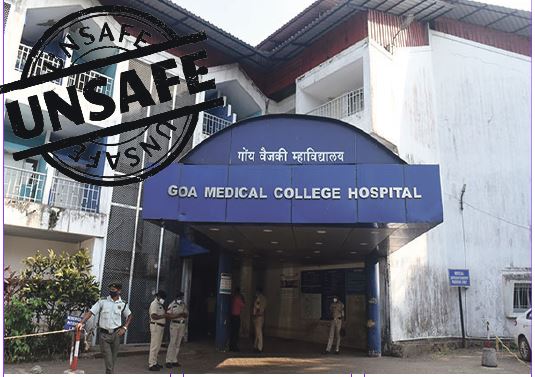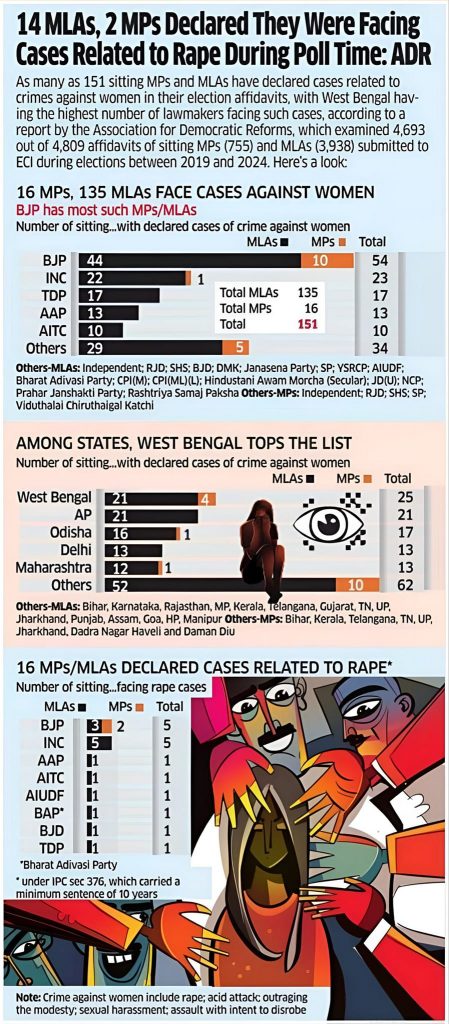Goa is abuzz with excitement as vintage bike and car owners, users, collectors and fans are decking […]

GMC UNSAFE FOR ALL!
Aug 24- Aug 30 2024, Cover Story August 23, 2024By Rajan Narayan
FOR the first time between last year and this year I spent almost five months in the Goa Medical College & Hospital — from October 2023 to February 2024. I was bedridden for most of this time, only graduating to a wheelchair towards the end of my stay (before discharge by Dr Edwin Gomes who is Head of Department of the Geriatrics Ward No115).
I was admitted because after a year of negligence all my own ignorance, I was finally with the latest testing diagnosed with tuberculosis of the spine, a slow process during which time the TB bacilluis was practically eating up my spinal bones and virtually paralyzing me bit by bit. As it is I suffered from spinal problems courtesy injuries I’d received earlier during my years as editor of the OHeraldo. However, despite my current helplessness because of my spine (although recovered from the TB) I am utterly grateful that my mind continues to be restless and alert. Lying helplessly on my back in the hospital bed with no proper baths and only caretakers coming and going, I could see and be aware of everything that was happening me around my ward on a 24×7 basis.
I was often taken out both during the day and late in the evening or night for X-rays, scans and MRIs. Even for echo-cardiograms to the cardiology department in the new super-specialty block. I found most of the GMC corridors very badly lit although an improvement on the old corridors I remember vividly. It was a major adventure to be taken on a trolley stretcher from the Geriatric department ward No115 from the old block to the super-specialty block which is almost a km away. There is no direct pathway above or underground from the old GMC wards to the super-specialty block where a number of departments are now shifted including the cardiology department.
I spent almost five months at the Geriatrics ward, this is the most vulnerable ward of them all at the GMC. This is because the inner ward is occupied mostly by senior citizens with disabilities and a lot of diabetics patients in an advanced stage of the disease and in regular need of dialysis and badly infected feet in need of treatment and bandaging.
Many senior citizens here are not in a position to get up from the bed and seek safety if say there were to be an Emergency. In the absence of bell button to get in touch with the nursing station it can be quite unnerving if one panics in the middle of the night. The patients are practically speaking marooned. Unless they have a relative staying with them or a caretaker they cannot contact the nurses or the doctors elsewhere in the large and partitioned ward.
Unlike the other ordinary wards where entry to outsiders and visitors is restricted, anyone could walk into Ward No115 geriatric ward as they wished although there was a table where a security guard was on duty or not on duty. The security guard and nursing staff permit visitors anytime they want to visit their senior citizen patients. Which is all fine but this means there is no control even on other kinds of people including caretakers in search of new assignments with patients to walk in and out.
I recall that when the Goa Pradesh Congress President Amit Patkar came into the ward to visit me with four others nobody enquired or stopped him. Nobody stopped him from videographing and recording a mini-speech with me on the Opinion Poll. I was not the only exception, my total experience in the ward was a free flow of visitors at all times throughout the day and even the night which is understandable for sometimes a death of a patient may occur and there are crying relatives.
The GMC has a rule that no patient may be admitted to a ward unless there he or she has a relative or paid caretaker. So much so there are dozens of caretakers in every ward doing assignment with a patient or looking for assignments. Their number multiplied during the Covid-19 lockdowns for then even close relatives sought protection for themselves and did not want to stay with their patient full time. Most caretakers are semi-literate or illiterate half-trained or badly trained people from out of Goa.
Some of them have basic first aid training but most are just rudimentary caretakers doing daytime or nighttime duty at exorbitant rates. There is such a demand for caretakers in Goa that many are from out of the state, Maharashtra or Karnataka or Kerala or Tamilnadu, Bihar and even Nepal and the Northeast. Though they have no credentials of being well trained they demand a sum of Rs800 to Rs1,000 per 12-hour shift. This does not include a food allowance of Rs 200 per shift. If you hire a caretaker 24×7 you will end up spending Rs75,000 per month.
These caretakers are not regulated by the GMC or registered, many may not have even Adhaar cards or other documents. Most of them are supplied by two or three agencies which take a commission of 20-30% from them. Even Caritas with its trained caretakers takes a commission of 30% from the caretakers. Relatively, very few Goans want to earn a living in caretaking of patients.
No police verification is done of the background of patients’ caretakers although many become familiar with the doctors on duty in the wards. Outsider caretakers can pose as a threat not only to patients but to doctors and the nursing staff of a hospital for they may be on the sly business deals amongst them and when there is a difference of opinion when arguments break out even between patient and caretaker. Caretakers have no scruples abandoning a patient suddenly and without notice.
MARATHON SHIFTS
IN a government teaching hospital interns and residents have to work for 24 hours to 36 hours at a stretch. This is particularly true of post-graduates residents who are required to do a 36-hour shift twice a month. The fact that they get 48 hours off after the marathon shift is not a consolation. The nursing staff on the night shift also have to do a 12-hour shift from 8 pm to 8am. This is also true of the multitask staff many of whom are women. Most wards do not have an earmarked comfortable place for resident doctors and nurses to rest a bit during the deep night hours.
Depending on the Head of Department both the nurses and the resident doctors have a small duty room where they can rest. However, they are on call and are woken up at any time to attend to a patient in distress. Nurses do have the luxury of dozing off on their night desks at the nursing station after midnight till dawn, waking up to a patient’s bell when it rings.
The lights are normally put off and some dimmed even in the corridors post-midnight. Anyone can enter the ward at night between 10 pm to 6 am. The so-called security staff also happily go to sleep at their tables of duty, security staff at the GMC are a big joke.
Compared to earlier years today’s GMC has a huge number of security staff. The overwhelming majority of them are unemployed young men from Sattari, Health Minister Vishwajit Rane’s constituency. None of them are trained security guards, they don’t have to take their jobs seriously. Just making an unemployed youth wear a uniform does not necessarily make him into a good security guard. The only time security guards get hyperactive with their sticks when they are required to chase out relatives from the wards after duty hours are over. At other times they may entertain themselves on their mobile phones.
Few may question the security guards as they will inevitably respond by informing you that they are “Baba’s” (Vishwajit Rane) people. The superintendent of the GMC, Dr Rajesh Patil, once admitted to me that the security guards are not trained. In the light of the Kolkata incident Dr Patil may perhaps think of getting the security guards trained by senior police officers.
Coming to women’s attire we do think that women should be free to dress as they wish, but not at the workplace and particularly in hospitals. There is a restriction on wearing jewelry and excessive make-up by nurses and women resident doctors while they are on duty. We have not seen the married nurses or residents even wearing mangalsutra although they may be removing their daily required jewelry and keeping it in their purse when they come in to the wards for duty hours, they have a changing and storage room of their own.
Goa has a liberal tradition and unlike in other parts of the country women like to wear western outfits often. The majority of interns and junior residents in the GMC wear jeans and tops. We have to mention that there’s a physiotherapist attached to most of the wards and most of them are young women.
Patients come to GMC not only from Goa but from the neighboring states of Maharashtra and Karnataka where women from traditional homes are often in the saree with their heads covered modestly by pallu. The male patients don’t see women in Western attire or tight jeans or churidar-kameez. I’ll probably be trolled for observing that the majority of nurses in the GMC wear tight-fitting uniforms. The top half of the uniform is tucked to emphasize their bosom and back. Even matrons dress to reveal their femininity.
I have no issues with interns, nurses or resident doctors stressing on their feminine status. However, this may be considered provocative by the attendants of the patients who from out of Goa. After 6 pm or latest 8 pm the ward is virtually deserted. If a patient requests urgent medical attention he or she has to be shifted to the X-ray room or the scanning centre. The patient may have to be moved to the older wards or the super-speciality block. There is often only one ward boy accompanying an emergency patient and they have to rumble on the cold stretcher trolley through long ill-lit corridors.
I recall that on the eve of one of my operations, the resident decided that I should get an echo done. I was taken after 9 pm to the cardiac department for the echo. The corridors were deserted. Even in the cardiac department, there was a skeletal staff present. If I was a young woman I would have been nervous. Even young men or senior citizens can be victims of assault and robbery in such instances.
A resident doctor whom I know very well was telling me recently that patients are very nasty. Patients particularly from outside Goa can become very abusive. They keep demanding attention all the time. If the resident doctor does not respond immediately they are subject to abuse. Goans of course are perhaps far worse because they all seem to think that they are entitled to attention 24/7.

All Goans knew someone or the other who threatened residents and even the physiotherapist. Most doctors tend to be patient for they know patients have their own problems along what they’re suffering from and have to be treated for in hospital. The tragedy is that while the GMC has a lot of so-called public relations officers they do not come to the help of the doctors and the nursing staff.
What brutal rape and murder case of a second year student doctor which took place at a public Kolkatta hospital last week can happen in any hospital in the country including ambhe Goem. Cases of molestation and rape of minor children are increasing and police have become insensitive. Except in Casualty I have never seen police guards patrolling corridors or visiting the wards in the GMC.
Besides extreme cases of rape and molestation, there are a growing number of instances of relatives and patients attacking women resident doctors and the nursing staff. So women doctors and nurses require protection not only from outsiders but from relatives of patients too. There are cases of relatives of a patient assaulting a woman doctor in hospitals in the other states of India. This can also happen in Goa. Women doctors must have some kind of protection when they’re in hospital and in the wards.
Now there is movement all over the country to reclaim the night. This refers to ensuring the security of women who may go out for late-night parties. Women who might go to nightclubs or restaurants and return late at night. The attacks on women have imprisoned women. Most young women are afraid of staying out late at night.
A veteran women journalist has commented that it has become difficult to feel safe out at night and there is a great need for them to reclaim the night without male protection. The ground reality is that women do not feel safe any longer. It is not a coincidence that a leading national daily carried a report on a girl who hitched a ride and was sexually assaulted by the man who generously offered to give her ride. The 21-year-old college student thought she was reclaiming the night and attended a party with his friend in a Bengaluru suburb. Her friends could not drop her home as there was a problem with the car. So she accepted a ride with a friendly motorcyclist in the early hours of the morning. Instead of dropping her home the biker took her to an isolated place and raped her.
Fortunately, the young woman pressed an SOS button on her mobile which alerted her friends about her location. They came and rescued her though it was a little too late. They found her without any clothes and bleeding because of the sexual assault on her. Having an emergency button on your mobile can offer you some protection. Reclaiming the night is not easy if you’re a woman, young and want to enjoy your life in India.















